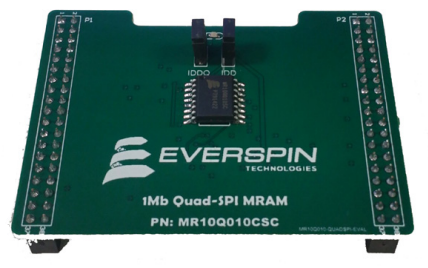Everspin’s new xSPI product family is based on the EXpanded Serial Peripheral Interface, the latest JEDEC standard for non-volatile memory devices. xSPI products use Everspin’s unique industrial Spin-Transfer Torque (SST) MRAM technology, which delivers a significant reduction in switching energy compared to their Toggle MRAM. It is highly scalable, enabling higher density memory products with long data retention, small cell size, high endurance, and low power.
The products themselves offer high-performance, multiple I/O, and SPI-compatibility, and they feature a high-speed, low pin count SPI compatible bus interface with a clock frequency of up to 200 MHz. These persistent memory MRAM devices come in sizes from 8 Mb to 64 Mb and operate on a single 1.8 V power supply, delivering up to 400 MBps for both reads and writes via eight I/O signals. With unlimited read, write, and erase operations for the supported life of the product, Everspin boasts 10 years minimum data retention across the two operating temperature ranges – commercial (0°C to +70°C) and industrial (-40°C to +85°C). For more power-efficient operations, the devices also offer low power modes with standby at < 350 µA (64 Mb version) and deep power down at approx. 50 µA (exit time < 100 µS).
Such operation ushers in a new era of universal memory application solutions, replacing products such as SRAM, BBSRAM, NVSRAM and NOR devices, targeting industrial automation, process control, emulation, automotive and transportation, gaming, and the broader industrial IoT markets.
To aid in evaluating their technology, Everspin makes several evaluation boards, including one for the xSPI MRAM family, but we are doubtful whether the board pictured is actually for these devices despite its presence on the product webpage; it seems that the range is so new that the information is not there in the same way as for older products.
The board is an FPGA-based system with an industry-standard xSPI controller embedded for testing and evaluating the STT-MRAM device. From investigating Everspin’s other evaluation products, it looks like a host board will be required to test the technology. There are a few that have been suggested in the guides for other products, namely the ST Micro NUCLEO-L476RG, but until the full documentation is made available by Everspin, we can’t be sure of which board will be required. The implementation for testing, however, seems very straightforward and well supported.
Keep designing!
(Image sourced from Everspin)

